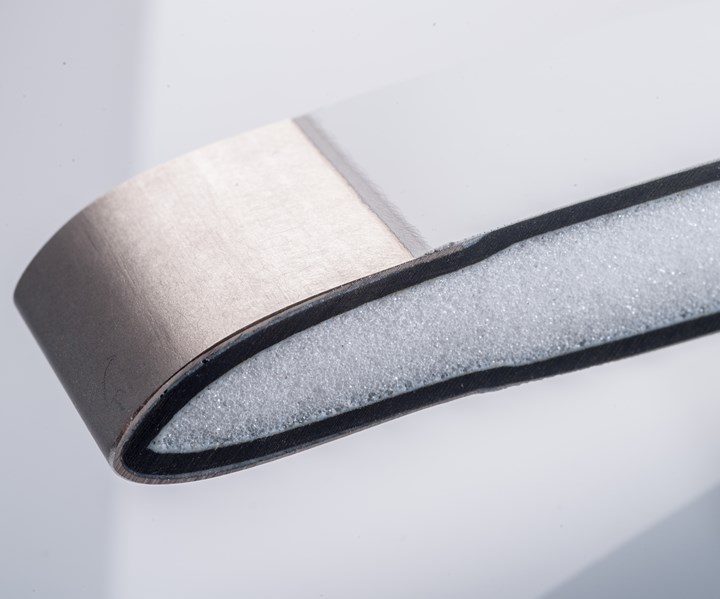Evonik rigid foam cores utilized for automated composites fabrication
Foam cores specialist Evonik is featuring the results of a joint study by Evonik Industries, Composite Technology Center GmbH and Deutsche Zentrum für Luft- und Raumfahrt e.V., on the use of rigid foam material in automated production.

Evonik ROHACELL foam core. Source | Evonik
Editor’s note: CompositesWorld received several new product and technology announcements ahead of JEC World 2020, which had been scheduled for March 3-5. Although that exhibition was postponed to May, CW is now publishing the announcements we received. This is one of them.
Foam cores specialist Evonik (Marl, Germany) is featuring the results of a joint study by Evonik Industries, Composite Technology Center GmbH and Deutsche Zentrum für Luft- und Raumfahrt e.V., on the use of rigid foam material in automated production. Study results confirmed the advantages of using rigid ROHACELL foam, the closed-cell polymethacrylimide foam (PMI) from Evonik, and automation when building complex structures like aircraft flaps, spoilers, gear doors and other structures produced in high volumes.
Innovative part design in a current application is on display in a partial composite helicopter main rotor blade produced by Van Horn Aviation (Tempe, Ariz., U.S.) for the 206B JetRanger helicopter. The blade was fabricated with a ROHACELL 71HERO foam core and Toray carbon fiber, then autoclave co-cured. Cutaway sections on the blade enable visitors to view interior construction. Also presented will be a core section of an aircraft wing demonstrator featuring novel puzzle-joint connection design, from Pronat Aerospace (Israel).
Introduced to the market almost 50 years ago, ROHACELL foam offers high strength and stiffness, temperature resistance up to 220°C (428°F) and good compressive creep strength at elevated temperatures. The rigid foam is used in aircraft, automobiles, ships, sports goods, electronics and medical technology.
Related Content
-
Plataine unveils AI-based autoclave scheduling optimization tool
The Autoclave Scheduler is designed to increase autoclave throughput, save operational costs and energy, and contribute to sustainable composite manufacturing.
-
Industrial composite autoclaves feature advanced control, turnkey options
CAMX 2024: Designed and built with safety and durability in mind, Akarmark delivers complete curing autoclave systems for a variety of applications.
-
Advanced autoclaves, ovens provide efficiency, precision and intelligent control
CAMX 2025: Olmar is highlighting its next-gen autoclaves and industrial ovens for composites curing to improve throughput, scale production and achieve tighter quality control.













